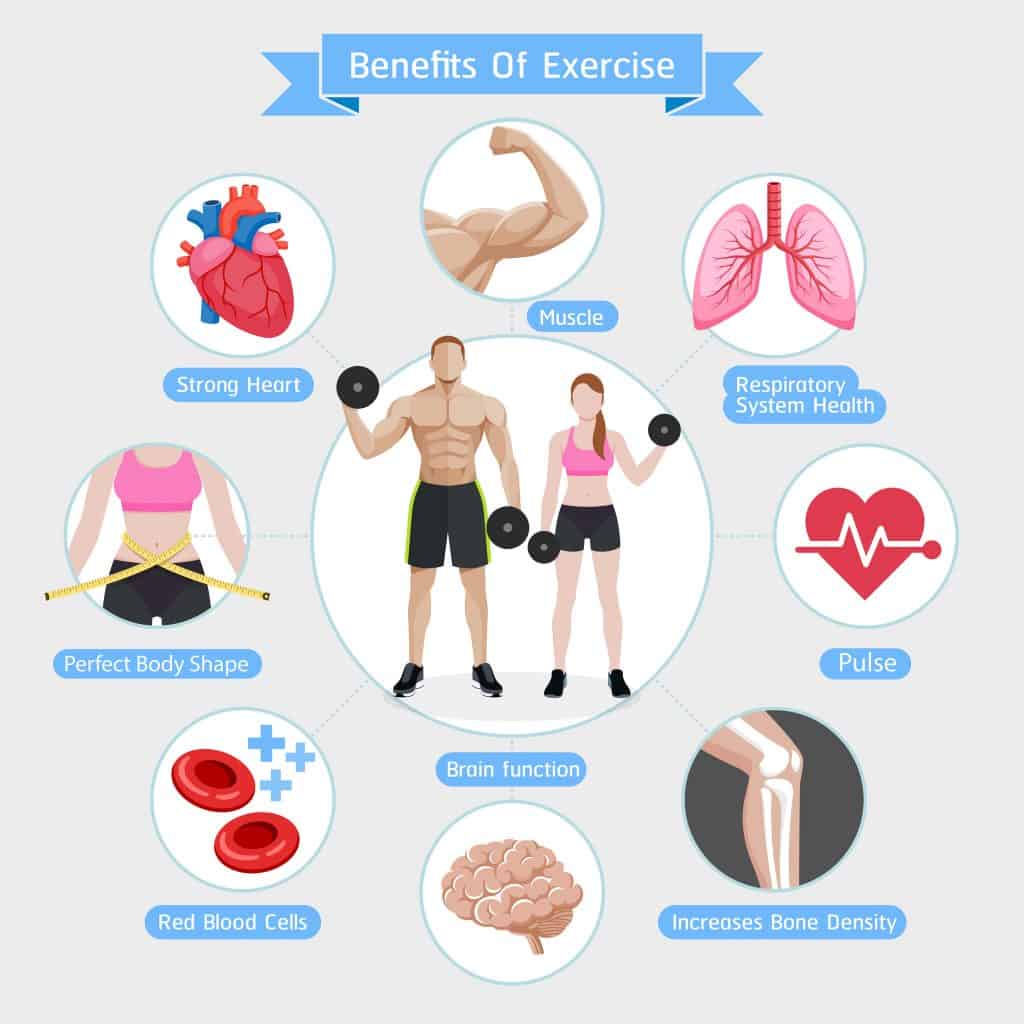Does Exercise Help Depression? Improve Your Mood and Brain Health
Posted by Prescription Hope - See Editorial Guidelines (Last Updated On: Mon Jul 06 2020)
Exercise, regardless of the type, can have extraordinary benefits. We’ve all heard that in order for us to be healthy we need to exercise. We need to work out to stay in physical shape. But could exercise go beyond just the physical and improve mental health? Does exercise help depression? In this article, we’ll discuss how exactly exercise helps depression. First, we need to cover what depression is and how to identify it.
What exactly is depression?
In simple term, depression is a medical condition that impacts the way you feel. Depression can vary from mild to severe and causes sadness or loss of interest in activities. There are circumstances in life where it is natural to feel sad or to have times where you lose interest in something. This is not depression. For example, grieving due to losing a loved one is not depression. It is a natural process that we all go through. In this case, feelings of sadness will come in waves and self-esteem is kept level. However, in those who are depressed their self-esteem levels will remain low. Their mood and interest are usually decreased for a period of two weeks or more. They may experience a loss of appetite and energy. Thoughts of death and suicide may also be prevalent in those with major depression.
The difference between those who are depressed and those who are not, is the brain chemistry. Life experiences can worsen one’s depressive state, but the problem ultimately lies within the brain.
According to studies, women are two times more likely to suffer from depression than men. Studies also show that those under 25 that suffer from depression may experience more thoughts about suicide. Depression can affect anyone, even those that seem to be in the ideal living situation.
However, in those who are depressed their self-esteem levels will remain low. Their mood and interest are usually decreased for a period of two weeks or more. They may experience a loss of appetite and energy. Thoughts of death and suicide may also be prevalent in those with major depression.
The difference between those who are depressed and those who are not, is the brain chemistry. Life experiences can worsen one’s depressive state, but the problem ultimately lies within the brain.
According to studies, women are two times more likely to suffer from depression than men. Studies also show that those under 25 that suffer from depression may experience more thoughts about suicide. Depression can affect anyone, even those that seem to be in the ideal living situation.
Why are we talking about this?
Over the year’s depression has been on the rise. It used to be something that almost seemed taboo to talk about, but in recent years it has been a fairly prevalent topic. Perhaps, not prevalent enough. The National Survey on Drug Use and Health claimed that in 2017 roughly 7% of adult Americans had a depressive episode within the last year. That number comes out to be a little over 17 million people. On top of that staggering number, suicide is the 10th leading cause of death in America. What’s even worse? Among those who are between 10 and 34, suicide is the 2nd leading cause of death. If depression is left untreated it can go beyond just the mental. Due to depression’s ability to decrease one’s appetite and energy levels, it will begin affecting one’s physical conditions as well. This puts you at an increased risk of suffering from different illnesses and maybe infections. So, needless to say, this is a topic that cannot be avoided. We have to find the root cause of this rise in depression and anxiety. And what is going to solve the problem once we find out the cause? We all know there are depression medications that can help. But not everyone can afford the medications we need or maybe medications aren’t a viable option for those with severe allergies. So, this begs the question. Does exercise help depression?How does exercise help depression?
We all recognize the fact that with exercise, physical daily functions become easier. But what about our mental function? Believe it or not, exercise greatly impacts our mental function. It turns out that our brain can be more active during or immediately after exercise, than when we’re sitting still thinking. When we exercise our brain will release a protein called brain-derived neurotrophic factor (BDNF). This protein is responsible for repairing and maturing neurons. This can get extremely complex so to sum it up, BDNF plays a crucial role in the learning and memory parts of our brain. Therefore, through exercise, our brain develops new connections which leads to stabilization in our mood.
Other endorphins are released when we exercise as well. Exercise has the potential to raise serotonin levels. This raise in serotonin can actually boost your appetite and help stabilize your mood. On top of this, it can help regulate your sleep cycles.
On a more practical note, exercise distracts your mind. For a moment, you stop worrying about everything going on and you focus on the movement at hand. This gives your brain the rest it needs.
You also may start to like the way you look which boosts your self-esteem. Thus, improving your mood even more.
So, the question is no longer, how does exercise help depression. Rather, is there anything exercise can’t do?
When we exercise our brain will release a protein called brain-derived neurotrophic factor (BDNF). This protein is responsible for repairing and maturing neurons. This can get extremely complex so to sum it up, BDNF plays a crucial role in the learning and memory parts of our brain. Therefore, through exercise, our brain develops new connections which leads to stabilization in our mood.
Other endorphins are released when we exercise as well. Exercise has the potential to raise serotonin levels. This raise in serotonin can actually boost your appetite and help stabilize your mood. On top of this, it can help regulate your sleep cycles.
On a more practical note, exercise distracts your mind. For a moment, you stop worrying about everything going on and you focus on the movement at hand. This gives your brain the rest it needs.
You also may start to like the way you look which boosts your self-esteem. Thus, improving your mood even more.
So, the question is no longer, how does exercise help depression. Rather, is there anything exercise can’t do?
What else can exercise do?
Beyond improving one’s mood and depressive state, exercise can help slow cognitive decline. Meaning, it helps our mind stay sharp as we get older. Through exercise, more oxygen and glucose are pumped towards the brain which aids in releasing some of the hormones discussed above. This protects the brain from losing connections and from declining due to age. Depending on the types of exercises being performed, it can improve cardiovascular health and also create bone density. Ultimately, this leads to not just a longer life, but a more fulfilled life.Can a doctor prescribe exercise to help depression?
Depending on the doctor you go to and what your medical condition is, a doctor may prescribe exercise. And just like any other medication, they may give you a “dose”. Exercise can be a very daunting task. For someone who hasn’t done the research or doesn’t have experience, it can be almost impossible to start. So, a doctor just telling their patient to exercise more just simply isn’t enough. The doctor, when prescribing exercise, should give specific instructions. For example, they may give a frequency of 3-4 times a week at a moderate level. They may tell you what specifically to do, whether that be walking, jogging, or light lifting on machines if that’s accessible. It is important that you talk to your doctor about the benefits of exercise and that you don’t just take our word for it. If you are seeing a doctor for depression, then ask them about how exercise helps depression.Where do you start?
 If you are struggling with depression and are wanting to improve your mood, then start going on walks. Simply walking outside 3-4 times a week has the potential to start improving your mood.
Now, getting up and doing this is much easier said than done, especially if you are depressed. So, have someone hold you accountable. Have a close friend or family member go on a walk with you.
From there, turn one of those walks into a jog. Gradually increase the level of exercise you are performing. Again, talk to your doctor.
Antidepressants may prove to be beneficial to help you start exercising. They might be the resource that helps you start going on walks in the morning. Talk to your doctor about the best way to exercise while taking antidepressants.
If you are struggling with depression and are wanting to improve your mood, then start going on walks. Simply walking outside 3-4 times a week has the potential to start improving your mood.
Now, getting up and doing this is much easier said than done, especially if you are depressed. So, have someone hold you accountable. Have a close friend or family member go on a walk with you.
From there, turn one of those walks into a jog. Gradually increase the level of exercise you are performing. Again, talk to your doctor.
Antidepressants may prove to be beneficial to help you start exercising. They might be the resource that helps you start going on walks in the morning. Talk to your doctor about the best way to exercise while taking antidepressants.

